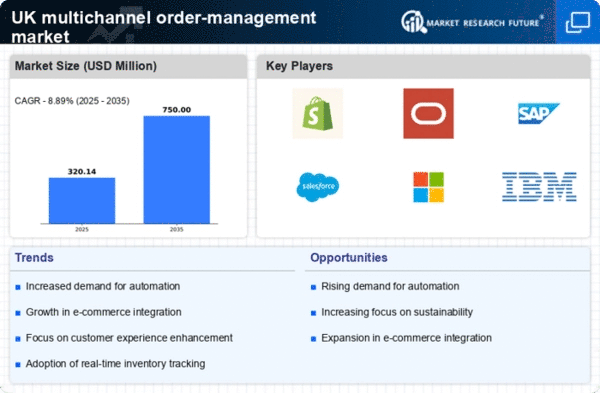E-commerce Growth Surge
The rapid expansion of e-commerce in the UK is a primary driver for the multichannel order-management market. With online retail sales reaching approximately £200 billion in 2025, businesses are increasingly adopting multichannel strategies to cater to diverse consumer preferences. This shift necessitates robust order-management systems that can seamlessly integrate various sales channels, ensuring efficient inventory management and order fulfillment. As consumers demand faster delivery and more flexible shopping options, companies are compelled to enhance their operational capabilities. The multichannel order-management market is thus positioned to benefit from this e-commerce growth, as businesses seek solutions that can streamline processes and improve customer satisfaction.
Shift Towards Subscription Models
The rise of subscription-based business models is emerging as a significant driver for the multichannel order-management market. In the UK, subscription services are gaining traction, with an estimated market value of £1.5 billion in 2025. This shift requires businesses to adopt flexible order-management systems capable of handling recurring orders and managing customer subscriptions across various channels. As consumers increasingly prefer the convenience of subscription services, companies must ensure their order-management solutions can accommodate this trend. The multichannel order-management market is thus likely to see increased demand for systems that support subscription management, enhancing customer retention and satisfaction.
Consumer Demand for Personalisation
In the UK, consumers are increasingly seeking personalised shopping experiences, which significantly impacts the multichannel order-management market. Research indicates that 80% of consumers are more likely to make a purchase when brands offer personalised experiences. This trend compels retailers to implement sophisticated order-management systems that can track customer preferences across multiple channels. By leveraging data analytics, businesses can tailor their offerings and communications, enhancing customer engagement and loyalty. Consequently, the demand for advanced multichannel order-management solutions is likely to rise, as companies strive to meet the expectations of a more discerning consumer base.
Regulatory Compliance and Standards
The multichannel order-management market in the UK is also influenced by the need for compliance with various regulations and standards. Businesses must navigate complex legal frameworks, including data protection laws and consumer rights regulations. Compliance not only ensures legal adherence but also builds consumer trust. As companies expand their operations across multiple channels, the complexity of maintaining compliance increases. This scenario drives the demand for multichannel order-management systems that incorporate compliance features, enabling businesses to manage their operations effectively while adhering to regulatory requirements. The focus on compliance is likely to shape the development of solutions within the market.
Technological Advancements in Logistics
Technological innovations in logistics are transforming the landscape of the multichannel order-management market. The integration of automation, artificial intelligence, and real-time tracking systems is enhancing supply chain efficiency. In the UK, logistics technology investments are projected to exceed £10 billion by 2026, indicating a strong commitment to improving operational capabilities. These advancements enable businesses to optimise inventory levels, reduce lead times, and enhance order accuracy. As a result, companies are increasingly adopting multichannel order-management solutions that can leverage these technologies, ensuring they remain competitive in a rapidly evolving market.
















